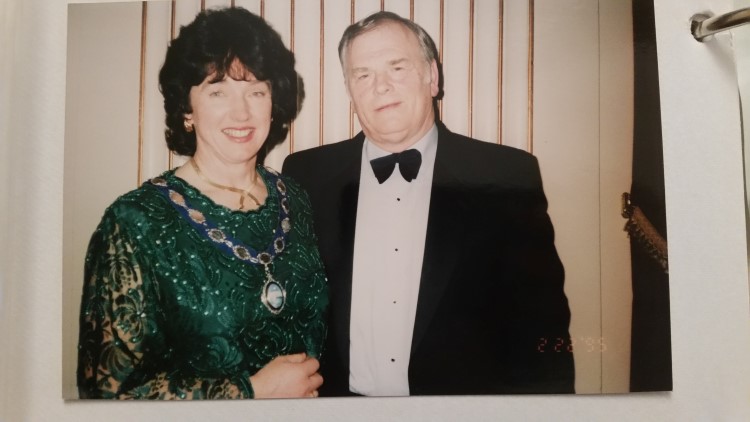Dementia carer praises Marie Curie support
Press release published
“I don’t remember the circumstances, but suddenly Angela was there like a little guardian angel and she was so kind, so gentle.”
Former singer Helen Hopkins is talking about Marie Curie dementia nurse Angela Powell, who provides her with support to care for her husband Alec, diagnosed with the condition in 2015.
Marie Curie is the UK’s leading terminal illness charity, providing care and support to people living with a terminal illness, and their families at home or in one of 9 hospices across the UK.
In West Wales, the charity also offers a dementia service, with specialist nurses providing nursing care and support.
Speaking ahead of Dementia Awareness Week this week, Helen, who lives in Llanddarog, Carmarthenshire with her husband, said there were a number of incidents which lead to her seeking a diagnosis for Alec – including that he stopped driving.
“He burnt out the clutch on a vehicle, which was just not my sharp-shooting, bright, breezy husband,” she said.
“I had a fall that year and he couldn’t take me to the hospital, so I had to get a neighbour to take me. Those were two odd little incidents.”
A letter to her GP raising her concerns saw her get an appointment for Alec – with a dementia diagnosis confirmed in 2015.
Initially, Helen said she did not realise there was any external support available and would care for Alec on her own, adding: “He wasn’t so bad that I couldn’t carry on.
“I did everything for him such as it was, and in those days he was still coping with toilet and everything. It was just a lack of interest, starting to forget names.
“Then I had a meeting with social services, but that was after I’d met Angela.
“There was a nurse who came and said ‘you should be doing this, you should be doing that’, and I said to her, I don’t want intrusion in the house. I said I’ve always promised my husband I would care for him. This is my home, it’s our little castle, we don’t want strangers, even if we get to know them.”
But she described support from Marie Curie as “gentle and kind”.
“I’m not a person to be pushed,” she said.
“As soon as someone says you ought to do this, you ought to have this, I can feel the barriers going up and I think no, I don’t want this.
“I’ve found that Angela didn’t push at all. Suggested, because she could see what would be good for me, and finally I agreed to respite. She made a heck of a difference, because she steered me in the right direction.”
Helen and Alec have received help from two close friends, which has allowed Helen to attend some social events with some organisations she has been involved in for a number of years.
Talking about those ‘breaks’, she said they allowed her to feel ‘free’, adding: “You don’t know what it’s like to be free.”
She has also had support from the Marie Curie team for Alec to have respite care.
“I’ve said to so many people since, contact Marie Curie if you’ve got problems,” she added.
“Angela consistently said to me, it’s your decision, it’s your husband, you love your husband, so you make the decision about respite, about anything.”
The Marie Curie dementia service has been running since 2013 in the Hywel Dda area, and in the last year supported 191 patients and their families.
Speaking ahead of dementia awareness week, Angela Powell, clinical nurse manager of the dementia service, said: “We want more people to understand that though people may live with dementia for a number of years, it is a terminal illness and the support and nursing care is available to people who may need it, particularly at end of life.
“Many people living with dementia may also have other health conditions diagnosed both prior to and following a dementia diagnosis, and we can help to provide care and support for these other conditions too.”
If you want to find out more about Marie Curie, visit www.mariecurie.org.uk.
If you or a loved one have been diagnosed with a terminal illness, the charity’s Information and Support Line team also provides a listening ear, with support line officers and Marie Curie Nurses available to speak to. Call 0800 090 2309.
